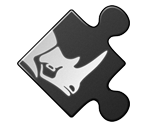User Data
RhinoCommon object plugin user data
// You must define a Guid attribute for your user data derived class
// in order to support serialization. Every custom user data class
// needs a custom Guid
[Guid("7098A105-CD3C-4192-A9AC-0F21017098DC")]
public class MyCustomData : Rhino.DocObjects.Custom.UserData
{
public int IntegerData{ get; set; }
public string StringData {get; set;}
// Your UserData class must have a public parameterless constructor
public MyCustomData(){}
public MyCustomData(int i, string s)
{
IntegerData = i;
StringData = s;
}
public override string Description
{
get { return "Some Custom Properties"; }
}
public override string ToString()
{
return String.Format("integer={0}, string={1}", IntegerData, StringData);
}
protected override void OnDuplicate(Rhino.DocObjects.Custom.UserData source)
{
MyCustomData src = source as MyCustomData;
if (src != null)
{
IntegerData = src.IntegerData;
StringData = src.StringData;
}
}
// return true if you have information to save
public override bool ShouldWrite
{
get
{
// make up some rule as to if this should be saved in the 3dm file
if (IntegerData > 0 && !string.IsNullOrEmpty(StringData))
return true;
return false;
}
}
protected override bool Read(Rhino.FileIO.BinaryArchiveReader archive)
{
Rhino.Collections.ArchivableDictionary dict = archive.ReadDictionary();
if (dict.ContainsKey("IntegerData") && dict.ContainsKey("StringData"))
{
IntegerData = (int)dict["IntegerData"];
StringData = dict["StringData"] as String;
}
return true;
}
protected override bool Write(Rhino.FileIO.BinaryArchiveWriter archive)
{
// you can implement File IO however you want... but the dictionary class makes
// issues like versioning in the 3dm file a bit easier. If you didn't want to use
// the dictionary for writing, your code would look something like.
//
// archive.Write3dmChunkVersion(1, 0);
// archive.WriteInt(IntegerData);
// archive.WriteString(StringData);
var dict = new Rhino.Collections.ArchivableDictionary(1, "MyCustomData");
dict.Set("IntegerData", IntegerData);
dict.Set("StringData", StringData);
archive.WriteDictionary(dict);
return true;
}
}
partial class Examples
{
public static Rhino.Commands.Result Userdata(RhinoDoc doc)
{
Rhino.DocObjects.ObjRef objref;
var rc = Rhino.Input.RhinoGet.GetOneObject("Select Face", false, Rhino.DocObjects.ObjectType.Surface, out objref);
if (rc != Rhino.Commands.Result.Success)
return rc;
var face = objref.Face();
// See if user data of my custom type is attached to the geomtry
// We need to use the underlying surface in order to get the user data
// to serialize with the file.
var ud = face.UnderlyingSurface().UserData.Find(typeof(MyCustomData)) as MyCustomData;
if (ud == null)
{
// No user data found; create one and add it
int i = 0;
rc = Rhino.Input.RhinoGet.GetInteger("Integer Value", false, ref i);
if (rc != Rhino.Commands.Result.Success)
return rc;
ud = new MyCustomData(i, "This is some text");
face.UnderlyingSurface().UserData.Add(ud);
}
else
{
RhinoApp.WriteLine("{0} = {1}", ud.Description, ud);
}
return Rhino.Commands.Result.Success;
}
}
Partial Friend Class Examples
Public Shared Function Userdata(ByVal doc As RhinoDoc) As Rhino.Commands.Result
Dim objref As Rhino.DocObjects.ObjRef = Nothing
Dim rc = Rhino.Input.RhinoGet.GetOneObject("Select Face", False, Rhino.DocObjects.ObjectType.Surface, objref)
If rc IsNot Rhino.Commands.Result.Success Then
Return rc
End If
Dim face = objref.Face()
' See if user data of my custom type is attached to the geomtry
' We need to use the underlying surface in order to get the user data
' to serialize with the file.
Dim ud = TryCast(face.UnderlyingSurface().UserData.Find(GetType(MyCustomData)), MyCustomData)
If ud Is Nothing Then
' No user data found; create one and add it
Dim i As Integer = 0
rc = Rhino.Input.RhinoGet.GetInteger("Integer Value", False, i)
If rc IsNot Rhino.Commands.Result.Success Then
Return rc
End If
ud = New MyCustomData(i, "This is some text")
face.UnderlyingSurface().UserData.Add(ud)
Else
RhinoApp.WriteLine("{0} = {1}", ud.Description, ud)
End If
Return Rhino.Commands.Result.Success
End Function
End Class
# No Python sample available

